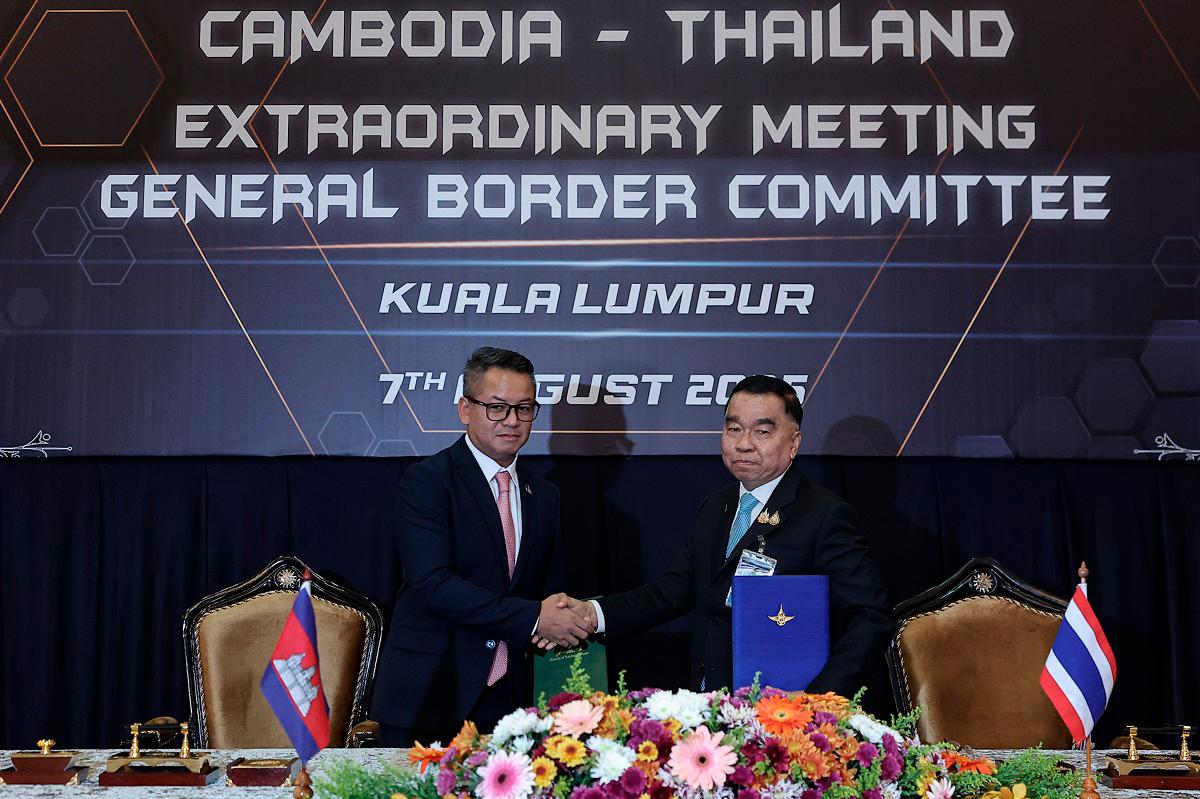KUALA LUMPUR: Thailand and Cambodia have agreed to strictly observe a ceasefire along their shared border, with both sides maintaining current troop positions while also refraining from any further reinforcements.
According to the Agreed Minutes of the Extraordinary General Border Committee (GBC) Meeting issued after the Extraordinary GBC Meeting here today, both sides must avoid unprovoked firing towards the other side’s positions or troops, which may escalate tensions.
“During the meeting, the two neighbouring countries also agreed to a ceasefire involving all types of weapons, including attacks on civilians and civilian objects and military objectives of either side.
“Thailand and Cambodia also agree to refrain from constructing or enhancing any military infrastructure or fortifications beyond their own side, also not to use any kind of forces against civilians and civilian objects in all circumstances,” according to the agreed minutes.
The Extraordinary GBC Meeting held at Wisma Perwira here today was co-chaired by Cambodia’s Deputy Prime Minister and Minister of National Defence General Tea Seiha, and Thailand’s Acting Minister of Defence General Nattaphon Narkphanit.
Also present during the meeting as observers were Malaysia’s Home Minister Datuk Seri Saifuddin Nasution Ismail, Deputy Defence Minister Adly Zahari and Chief of Defence Force General Tan Sri Mohd Nizam Jaffar, as well as United States Ambassador to Malaysia Edgard D. Kagan and Ambassador of China to Malaysia Ouyang Yujing.
The agreed minutes also emphasised that both sides reached a consensus to comply with international humanitarian law in the treatment of captured soldiers, including their living conditions, shelter, food, and medical care in case of injury.
“Captured soldiers shall be immediately released and repatriated after the cessation of active hostilities in accordance with Article 118 of the Third Geneva Convention of 1949 and Rule 128 (A) of the Customary International Humanitarian Law,” it stated.
It also noted that, in the event of an armed conflict, whether intentional or unintentional, both sides must promptly consult at the local level through existing bilateral mechanisms to prevent the situation from escalating along the entire border.
As such, the two countries also agreed to maintain regular communications between all army areas and military regions and units along the border of both sides and strive to solve all issues peacefully and avoid clashes, the agreed minutes read.
The agreed minutes also mentioned the convening of the Regional Border Committee (RBC) meeting, scheduled to be held within two weeks of today’s meeting, with the host to be determined based on the regular rotation system.
It also emphasised the need for regular and direct lines of communication at ministerial and Chiefs of Defence Forces level.
Meanwhile, in order to de-escalate tensions, mitigate negative public sentiment and foster an environment conducive to peaceful dialogue, both sides also agreed to refrain from disseminating false information or fake news.
Both sides agreed to schedule the next GBC Meeting within a month after today, with a venue to be decided later.
“Otherwise, another Extraordinary GBC Meeting should be called immediately with the same format as this Extraordinary GBC Meeting to discuss the ceasefire,” according to the agreed minutes. - Bernama









